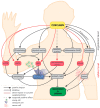The Role of Curcumin in the Modulation of Ageing
- PMID: 30871021
- PMCID: PMC6429134
- DOI: 10.3390/ijms20051239
The Role of Curcumin in the Modulation of Ageing
Abstract
It is believed that postponing ageing is more effective and less expensive than the treatment of particular age-related diseases. Compounds which could delay symptoms of ageing, especially natural products present in a daily diet, are intensively studied. One of them is curcumin. It causes the elongation of the lifespan of model organisms, alleviates ageing symptoms and postpones the progression of age-related diseases in which cellular senescence is directly involved. It has been demonstrated that the elimination of senescent cells significantly improves the quality of life of mice. There is a continuous search for compounds, named senolytic drugs, that selectively eliminate senescent cells from organisms. In this paper, we endeavor to review the current knowledge about the anti-ageing role of curcumin and discuss its senolytic potential.
Keywords: ageing; anti-cancer; autophagy; microbiota; senescence; senolytics.
Conflict of interest statement
The authors declare no conflict of interest.
Figures


Similar articles
-
Emerging senolytic agents derived from natural products.Mech Ageing Dev. 2019 Jul;181:1-6. doi: 10.1016/j.mad.2019.05.001. Epub 2019 May 8. Mech Ageing Dev. 2019. PMID: 31077707 Review.
-
Effects of Curcumin on Aging: Molecular Mechanisms and Experimental Evidence.Biomed Res Int. 2021 Oct 13;2021:8972074. doi: 10.1155/2021/8972074. eCollection 2021. Biomed Res Int. 2021. PMID: 34692844 Free PMC article. Review.
-
Cellular Senescence and Senolytic Agents: Recent Updates on Their Role and Applications.Curr Top Med Chem. 2024;24(2):157-178. doi: 10.2174/0115680266273698231107110956. Curr Top Med Chem. 2024. PMID: 38037999
-
Senolytics and the compression of late-life mortality.Exp Gerontol. 2021 Nov;155:111588. doi: 10.1016/j.exger.2021.111588. Epub 2021 Oct 9. Exp Gerontol. 2021. PMID: 34637949
-
Mechanisms of aging and potential role of selected polyphenols in extending healthspan.Biochem Pharmacol. 2020 Mar;173:113719. doi: 10.1016/j.bcp.2019.113719. Epub 2019 Nov 21. Biochem Pharmacol. 2020. PMID: 31759977 Review.
Cited by
-
Herb-Derived Products: Natural Tools to Delay and Counteract Stem Cell Senescence.Stem Cells Int. 2020 Oct 8;2020:8827038. doi: 10.1155/2020/8827038. eCollection 2020. Stem Cells Int. 2020. PMID: 33101419 Free PMC article. Review.
-
An Update on the Exploratory Use of Curcumin in Neuropsychiatric Disorders.Antioxidants (Basel). 2022 Feb 10;11(2):353. doi: 10.3390/antiox11020353. Antioxidants (Basel). 2022. PMID: 35204235 Free PMC article. Review.
-
Curcumin and Intestinal Oxidative Stress of Pigs With Intrauterine Growth Retardation: A Review.Front Nutr. 2022 Apr 28;9:847673. doi: 10.3389/fnut.2022.847673. eCollection 2022. Front Nutr. 2022. PMID: 35571913 Free PMC article. Review.
-
Curcumin displays a potent caloric restriction mimetic effect in an accelerated senescent model of rat.Biol Futur. 2023 Jun;74(1-2):221-229. doi: 10.1007/s42977-023-00170-7. Epub 2023 May 29. Biol Futur. 2023. PMID: 37247086
-
A Deep-Learning Proteomic-Scale Approach for Drug Design.Pharmaceuticals (Basel). 2021 Dec 7;14(12):1277. doi: 10.3390/ph14121277. Pharmaceuticals (Basel). 2021. PMID: 34959678 Free PMC article.
References
-
- The World Bank. [(accessed on 26 February 2019)]; Available online: https://data.worldbank.org.
Publication types
MeSH terms
Substances
Grants and funding
LinkOut - more resources
Full Text Sources
Medical

